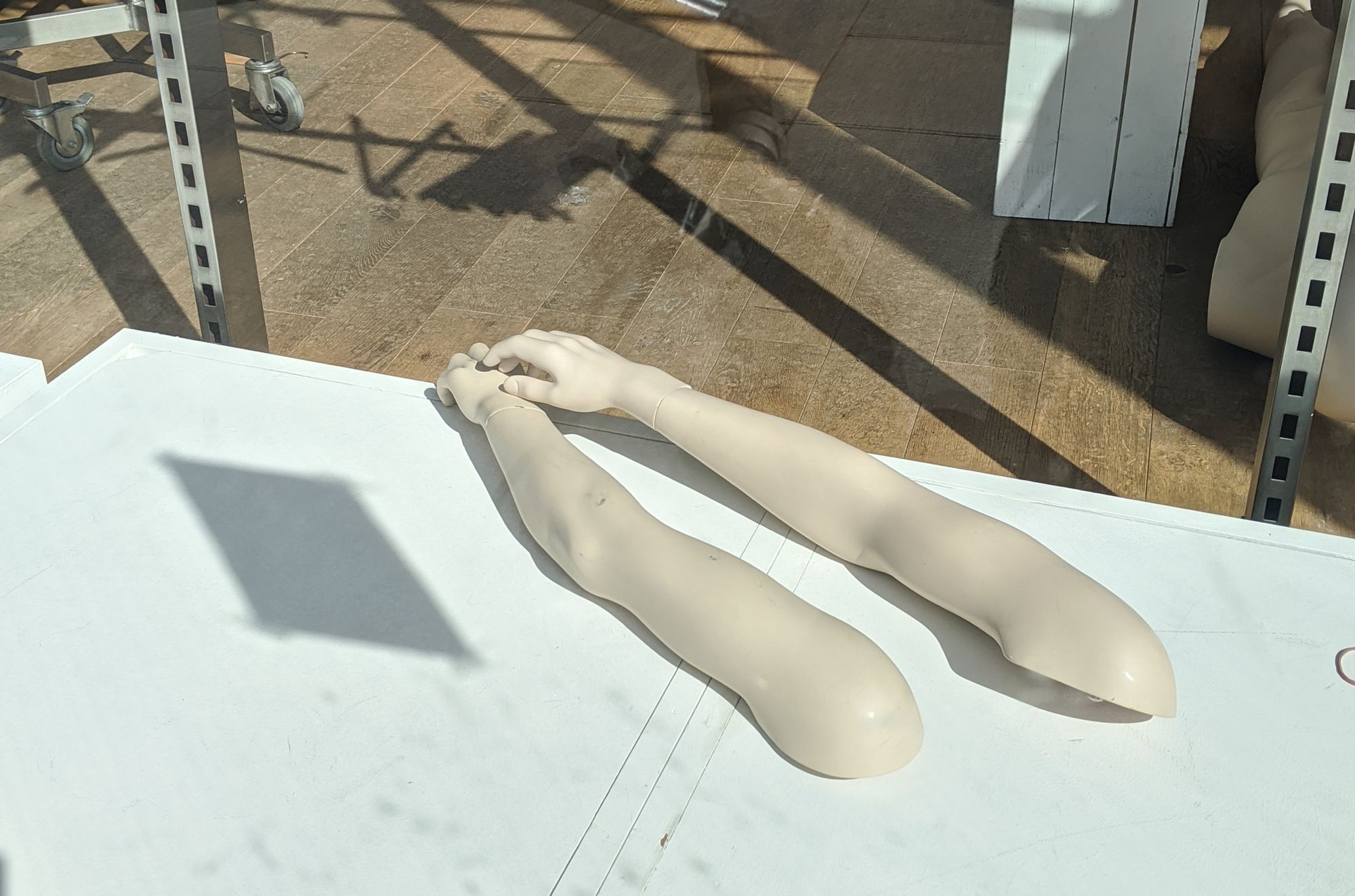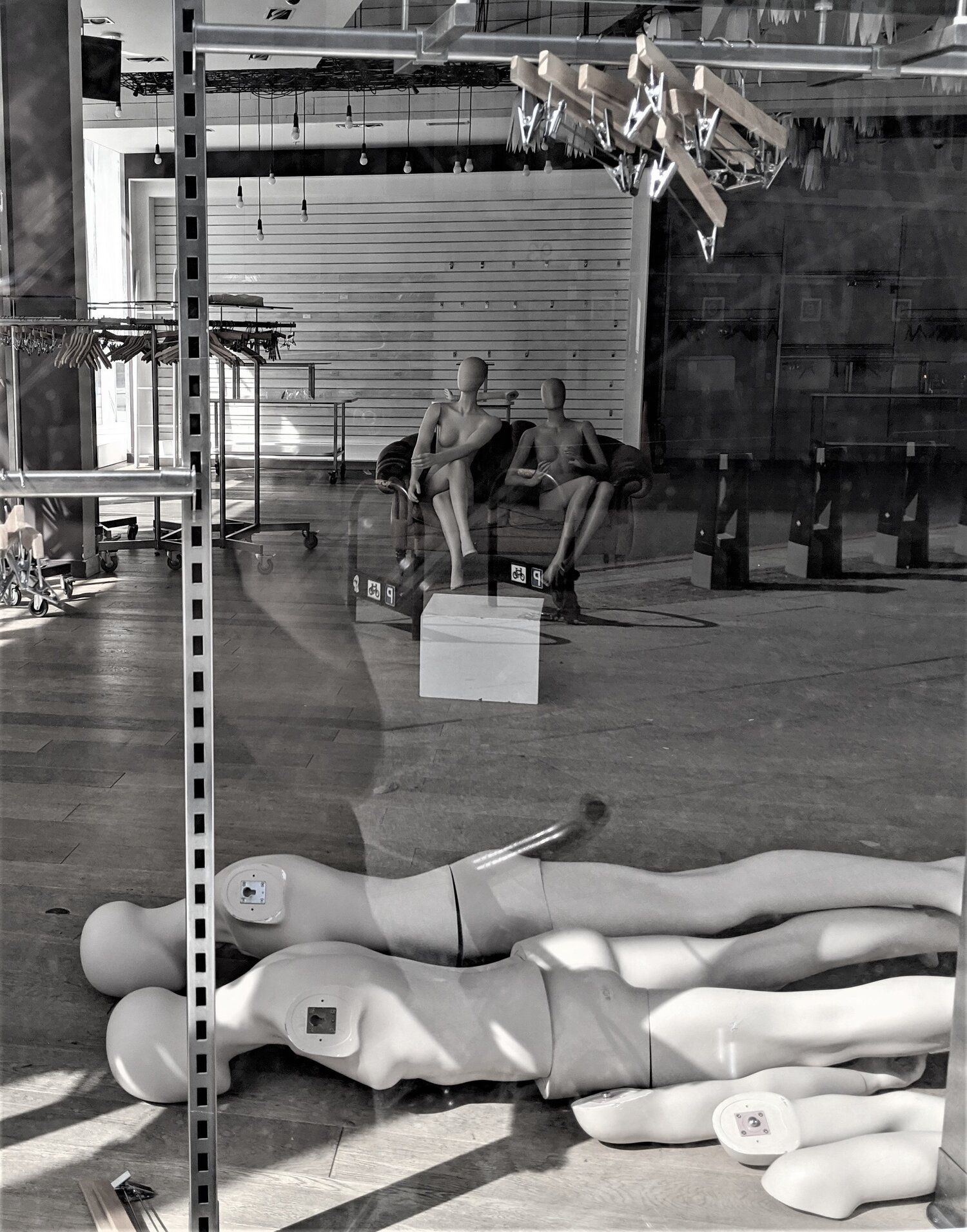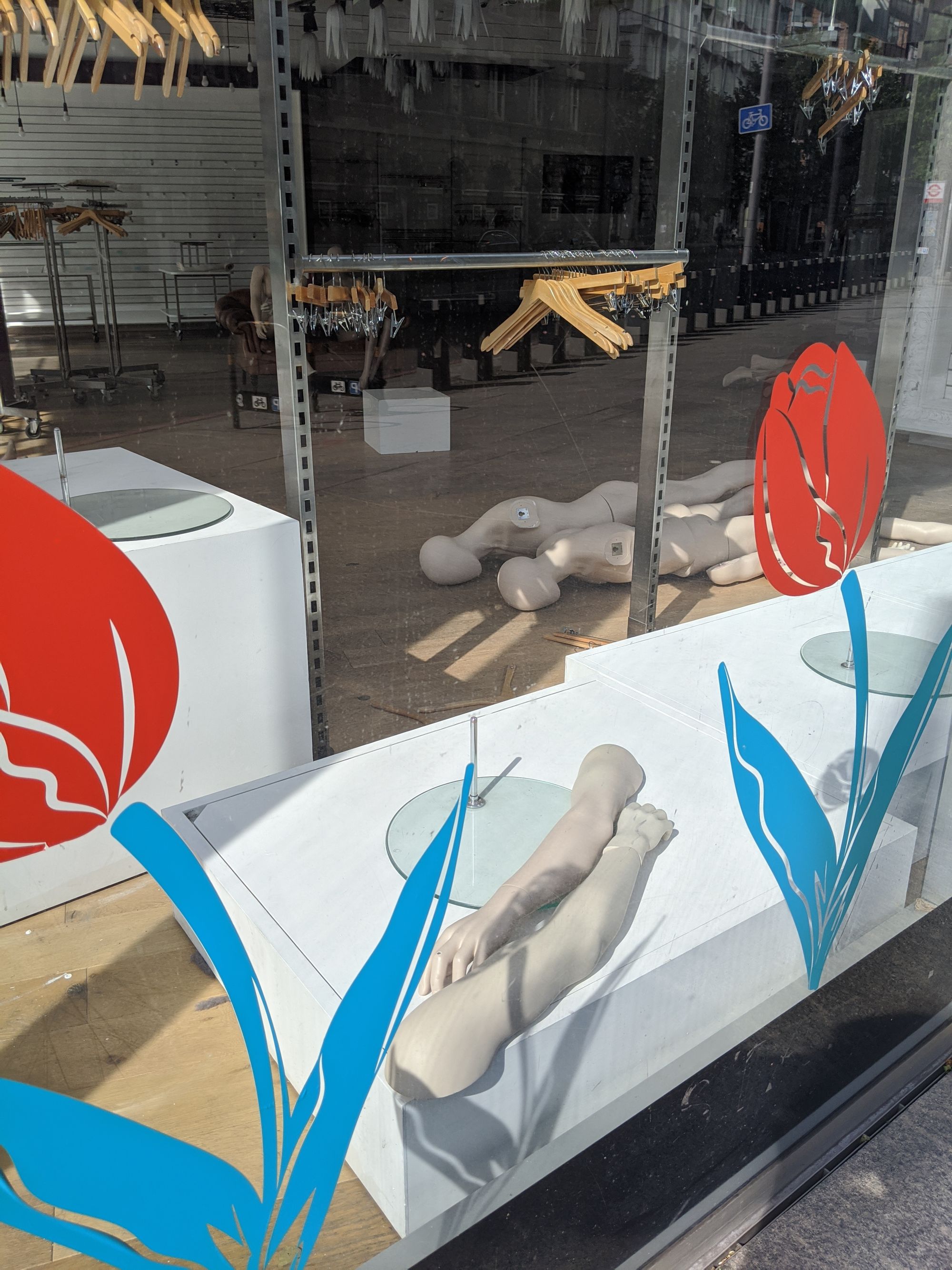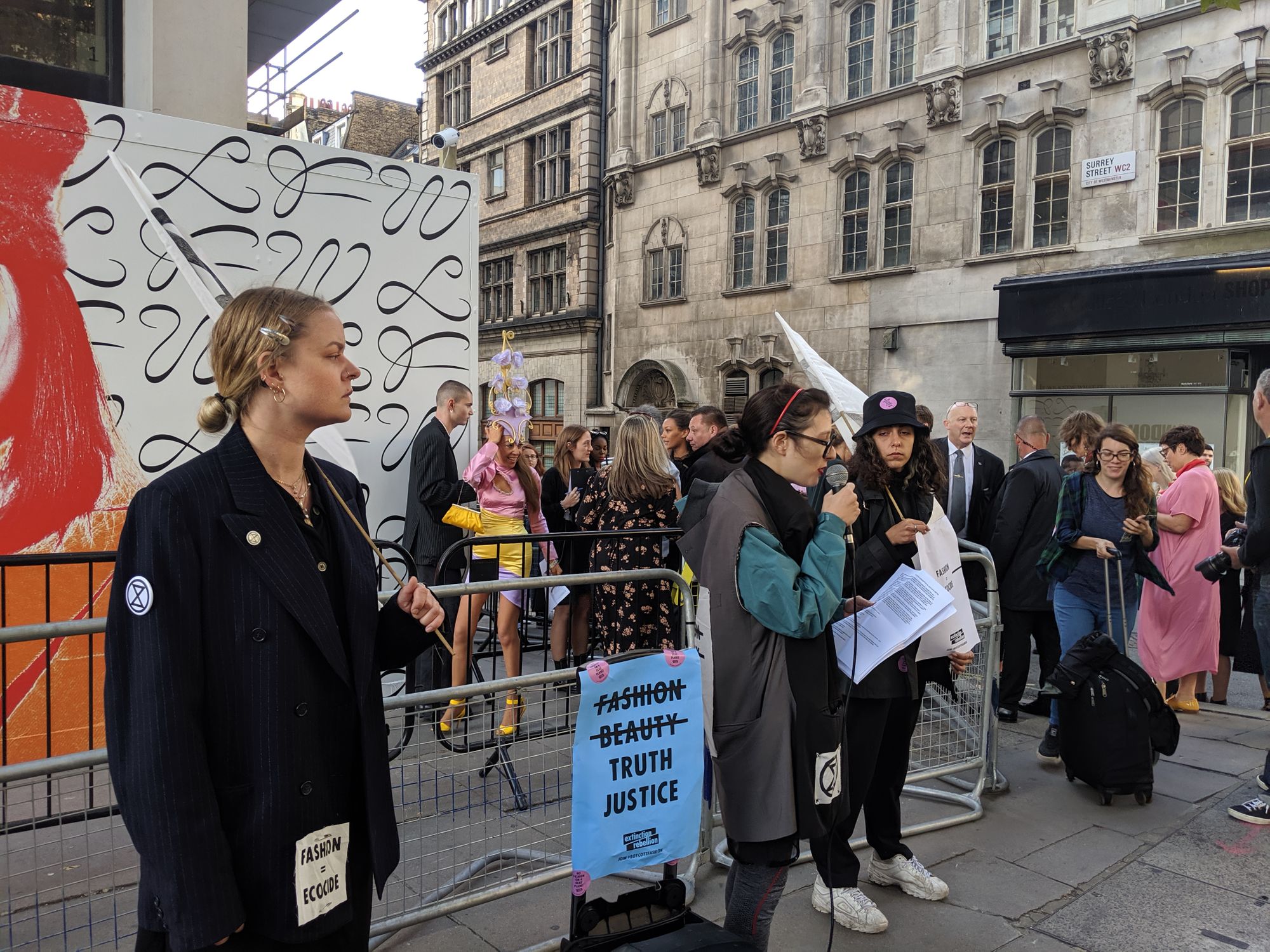Article - Bleak Friday: capitalism's drive to consume
Why do we keep shopping even in the midst of a pandemic? How do we escape the trap?

The last Friday of November has become known as 'Black Friday', the busiest shopping day of the year. This year, coming in the middle of a global pandemic that for most people has dramatically shrunk the size of their physical and social orbit, the consumerist highs of the holiday season will be particularly stressful. This essay looks at the need to move beyond capitalism's drive to consume.
October’s Critical Mass, a monthly cycle protest that has wound its way through the streets of London and other global cities for the past few decades in a carnival-esque break from normality with flags, sound systems and wheelies, could not find much normality to interrupt—until it reached London’s Oxford Street.
Seventy bikes on a night time ride through London is an unexpected sight at any time, but in October it was overshadowed by tens of thousands of people wandering in and out of shops, all while a global pandemic raged around them. Teenage boys on bikes set off fireworks with a loud bang, colourful sparks showered everywhere, people screamed and for just a moment the spell of the shops was broken.
Less than a week later, Britain’s second national lockdown would be declared and most retail outlets shut down. But, without missing a beat, Black Friday, plus Singles Day in China and the impending arrival of Christmas, have once again ramped up the pressure to consume, prompting the need to unpick some of the reasons why we keep shopping, even during a pandemic.
Under pressure
Many of us have spent 2020 in a dramatically reduced physical and social orbit. At times, it has been illegal to have visitors to your home, and social gatherings, work commutes, and school runs all but disappeared for months on end. Much has been made of a global pause and of people rediscovering what really counts when the bustle of normal life drifts away. But one thing that did not pause is shopping for non-essential items.
In April I spoke with Jak, a stressed-out delivery driver contracted to ASOS. Orders had reduced, but they had not stopped. Within his postcode patch he found himself repeatedly delivering packages to the same customers. People would open their doors without giving him time to step back two meters, he had to press lift buttons and touch door handles without knowing if they were infected. He lacked proper PPE and only one person had ever bothered to acknowledge his role in their life and say thank you. He was not happy to be risking his life so people could have a new t-shirt.


Since toilet paper mania hit the UK at the start of the first lockdown, judging other people’s shopping habits has become something of a national pastime. The temptation here, then, is to dismiss these ASOS customers as merely hopelessly selfish beings who lack the willpower and the moral fortitude needed to cope with a global crisis. But to do this would be to miss out on some critical insights about consumption. If we dismiss shoppers and shopping we will never truly understand how we have collectively become so lost.
Public consumption must be understood as a social act. It is something we do as part of a peer group, to establish and maintain our place within it. This is not a benign or restful state of affairs—it requires constantly reassessing and updating of what we have, monitoring the competition and being fearful of falling behind.
In recent years, this pressure has only gotten worse. It used to be that we consume to keep up with our own social class. Now, as eminent consumption expert Dr Juliet Schor has written, the “aspirational gap” is enormous. No longer must you keep up with the Jones’s, but with the Kardashians as well. It’s not that humans are inherently greedy, writes Dr Schor, it’s that they are driven by a target and one that drifts further and further out of reach all while being marketed as accessible if you only just keep going.[1]
Modern life also explains why, despite our shrinking orbits, the pressure to shop did not go away during the pandemic. The pressure remained constant, with adverts on television, radio, billboards, and across the internet. We continued to experience it when we watched films, TV shows, and music videos all of which are filled bold images to encourage us to dream of how life could be if we had more (a special shout out here to Emily In Paris whose sole function seems to be adverting the worst aspects of consumer culture). And of course, there is social media where ‘insights’ into the lives of celebrities, marketers, and friends reduce the line between public and private consumption to commodify further aspects of our lives.
The more vicious side to this pressure is threat. As we enter a period of record job losses and rising unemployment rates the threat of lost social standing will become more apparent to more people. As our ability to earn becomes more unstable and erratic, it becomes even more impossible to consume all the things we are told we need to make us happy. With household debt already at £1.28 trillion, £119 billion of which is not mortgages but credit cards and personal loans, there will be even more pressure to fall deeper into unsustainable debt.[2]
There is a deep cruelty to this system that pressures us to spend while not providing the jobs or income security to let us do so, and which provides a deeply inadequate safety net for when things go wrong. It is an urgent reason why we need to change the way the world is run.
Not an equal playing field
There are many reasons to challenge overconsumption and its driving force of overproduction, not least because, as Kate Soper points out in her latest book Post-Growth Living, we have a decade left to prevent runaway climate change, one aspect of which is the need to radically overhaul how we distribute and consume resources. Calls for change are often dismissed for fear they mean a lifestyle downgrade or protracted scarcity, but what Coronavirus shows once again is that the problem we face is not scarcity, but inequality.
The Covid pandemic has highlighted the fundamental inequality baked into the system—from Marcus Rashford’s school lunch campaign, that highlighted something we do not talk about enough, the right of some people to consume more, to the increasing wealth of the super-rich, whose assets have rocketed even under lockdown.
If we pause to look around us, the pandemic is a giant neon sign screaming that capitalism fails humanity: How is it right that online shopping has turned Amazon founder Jeff Bezos into the richest person on the planet with a personal fortune of $189billion,[3] while over 9% of the world’s population fall into an extreme poverty existence of £1.50 per day?[4] To transform how we consume we must end inequality.

Quality of life, not quantity of stuff
Marx believed private property has made us stupid. That we have lost the ability to conceive of things as ours unless we directly possess them and are the ones to eat, drink, wear or inhabit them. This has caused us to lose our sense of being without having.[5] This alienated state came as capitalism forcibly separated us from our labour and what we produced, leading to a loss of connection from our bodies, from nature, and from each other. In lockdown, for many this merely accelerated. While ‘isolated in our own crude solitariness,’ as Engels put it,[6] we scroll though shop websites, mediating our existence and our connection to the world via our relationship to things rather than other people or the planet.
By most metrics, this is not a healthy way to live. The commodities that surround us, from clothes to electronics, are steeped in violence. From the violence of colonial trade routes, to present day factory workers trapped in burning factories. At the other end of supply chains, life bubbles with dissatisfaction—bullshit jobs, an acute loss of control, and a system that presents shopping as salvation, identity, community and entertainment all rolled into one.
Is it any wonder that under neoliberalism, having endured decades of propaganda that says that community is dead and the ‘consumer is king,’ that people want to shop to deal with Covid’s sadness and uncertainty? That we sometimes feel more of a sense of connectivity with the things we buy than with the human beings, like Jak, who deliver them to our doors?
Twenty years ago, Dr Schor wrote that “We need voices for quality of life, not just quantity of stuff.”[7] Never has this been more relevant or vital than today. Capitalism is intent on stripping away the things that make life joyful and pandemics easier to handle: Lush and abundant communal outdoor space plus safe and free access to the countryside, plentiful leisure time and facilities, large communal indoor spaces, well-funded public services with respected staff, a flourishing arts sector, localised industry, nationalised utilities, and safe public housing to name but a few.
We have been sold a nightmare, one in which the communal question of what do we need is less important than the consumerist question of what do I want.[8] Yet the paucity of this strategy is here for all to see. We are interconnected and we cannot make it alone, we deserve more than a life of doom-scrolling and competitively hoarding toilet roll because we feel convinced no one will help us if the worst happens.
The alternative is also in plain sight. Despite the drive to privatise and shrink our lives, the good of this world cannot be crushed. Mutual aid groups have sprung up across the country providing not charity but mutual solidarity and connectivity, community gardens and new trees are being planted as people grow tired of looking at concrete, balconies are beginning to bloom, people are spending more time outdoors, friendships are deepening and familial and community ties taking on new meaning as non-material life finds cracks where it can grow.
In the months to come we will be pushed to identify more with the survival of corporate brands than with each other. We will be pushed to see shopping as a responsibility and as a way to save this sinking ship. But consumption is not a duty, capitalism has no intention of making us safe or happy, and you deserve far better than this.
First published by Verso Books.
[1]The Consumer Society Reader edited by Juliet B Schor & Douglas B Holt, The New Press, 2000. P451
[2] https://www.ons.gov.uk/peoplepopulationandcommunity/personalandhouseholdfinances/incomeandwealth/bulletins/householddebtingreatbritain/april2016tomarch2018
[3] https://www.theguardian.com/business/2020/oct/07/covid-19-crisis-boosts-the-fortunes-of-worlds-billionaires
[4] https://www.worldbank.org/en/news/press-release/2020/10/07/covid-19-to-add-as-many-as-150-million-extreme-poor-by-2021
[5]Marx’s Theory Of Alienation, István Mészáros, Merlin Press, 2005 P148
[6]Outlines of a Critique of Political Economy Frederich Engels, 1844
[7] The Consumer Society Reader edited by Juliet B Schor & Douglas B Holt, The New Press, 2000. P459
[8] Benjamin Barber, quoted in Foot Work – What Your Shoes Are Doing To The World, Tansy Hoskins, Weidenfeld and Nicolson, 2020 p35
